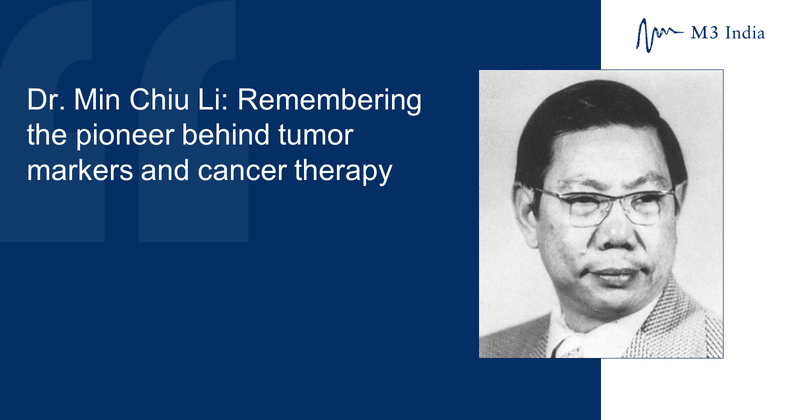Story of a re‘mark’able Oncologist: Dr. Min Chiu Li
M3 India Newsdesk Aug 02, 2018
The arrival and study of tumour markers has been a major breakthrough in actually acknowledging cancer as a disease which lurks in the body even when it is not seen visibly. And, all the credit for this should go to one man- Dr. Min Chiu Li.

The combination of chemotherapy, surgery, radiotherapy and now the upcoming field of immunological drugs have revolutionized cancer treatment for many types of cancers.
However, until the middle of the twentieth century, the story was very different. Long, arduous and painful rounds of chemo, coupled with painful, often debilitating surgeries was the norm. Moreover, very little was known about the actual nature of the disease, its origins, its causes and even how much treatment was necessary for it.
Treating the untreatable
In 1957, at the National Cancer Institute, in Bethesda, Maryland, a new doctor, Dr. Min Chiu Li had just arrived from the Memorial Sloan Kettering hospital in New York City. Li was not really interested in research but was working on choriocarcinoma (cancer of the placenta) patients at the National Cancer Institute (NCI).
Soon after he arrived, a woman with choriocarcinoma arrived, profusely bleeding and not responding to any measure of care. The patient did not survive long and passed away barely hours after she arrived at the NCI.
Until then, choriocarcinoma was not responding to most other regimens. However, Li decided to use antifolates, an effective class of drugs which were being used in treating paediatric cancers, mainly leukaemia. He used Methotrexate, a highly toxic drug on the next patient who arrived in a few weeks, in a similarly precarious condition as the earlier woman.
Li decided to give her a dose of Methotrexate and see if she survived. Somewhat surprisingly, she survived with the dose and was stable when Li came down for his rounds the next morning. Li continued to give her the drug regimen and the team at the NCI was stunned with what happened.
The patient’s tumours shrank and even disappeared from other sites such as her lungs. The disbelief regarding the patient’s improvement was such that the lab was asked to reconfirm all her results, which turned out to be spot on even after retesting them multiple times.
An insight and its consequences
Li was thrilled, and he began to write a paper with a colleague on the results for publication. This was a major finding considering that patients suffering from this kind of cancer almost never survived any form of treatment.
However, as he was writing his results, Li noticed that one of the tell-tale signs of the cancer, the level of human chorionic gonadotropin (hCG) was still lingering at low levels. It is ideally supposed to be negligible or too small to count in most people, and rapidly rise only during pregnancy, or in the unfortunate event of cancer. Li retested the samples but concluded that hCG was present in the blood of his patients.
Without asking his colleagues, Li decided to bring the hCG level down to zero. He administered multiple doses to his patients, and after many rounds of chemotherapy, the hCG level finally plummeted to zero. Li was thrilled at the results.
This however was considered to be grossly unethical by the ethics committee of the NCI. A visible disappearance of the cancer, commonly called clinical signs, along with improvement in patient parameters such as mobility and diet were considered to be sufficient and demonstrative of a cure. The ethics committee believed that Dr. Li had experimented on patients unnecessarily, and actually fired him from his job without conducting any further investigations or arguments.
The aftermath
Li ultimately left for New York again, vowing never to come back to the NCI. However, when his patient records were compared with other patients treated for similar diseases many years later, the NCI discovered a striking pattern.
The patients on Li’s treatment protocol were the only ones who largely never came back with a relapse. All others had inevitably come back to the NCI as patients, relapsing with the same form of cancer. Many years later, when multiple studies had been done to test if the tumour marker levels were a true assessment of the presence of cancer, did the NCI realize that Dr. Min Chiu Li had come upon a phenomenally effective approach in gauging the presence of cancer.
Cancer cells were too small to be detected by conventional diagnostics. Blood markers were a sure chemical footprint of their presence.
The NCI and cancer research fraternity then, formally adopted the testing of tumour markers as an important diagnostic tool for cancer, but only after Dr. Min Chiu Li was unceremoniously fired from his job, and after having spent many years in the inconsolable anger of being insulted by the oncological community.
Many years later, Li made another significant contribution to oncology, in 1960, he used a combination of drugs to treat patients suffering from testicular cancer and ultimately cured them of the disease, hence demonstrating that metastatic testicular cancer could be cured by a combination of chemotherapy and local control of the disease. Building upon his work, oncologists have now nearly brought five-year survival rates for testicular cancer patients at around 99%, nearly unheard of for most other cancers.
For his significant contributions to oncology, Dr. Li was awarded the Lasker-DeBakey Clinical Medical Research Award and was made the Chairman of the National Cancer Research Committee of the Taiwanese National Science Council.
-
Exclusive Write-ups & Webinars by KOLs
-
Daily Quiz by specialty
-
Paid Market Research Surveys
-
Case discussions, News & Journals' summaries